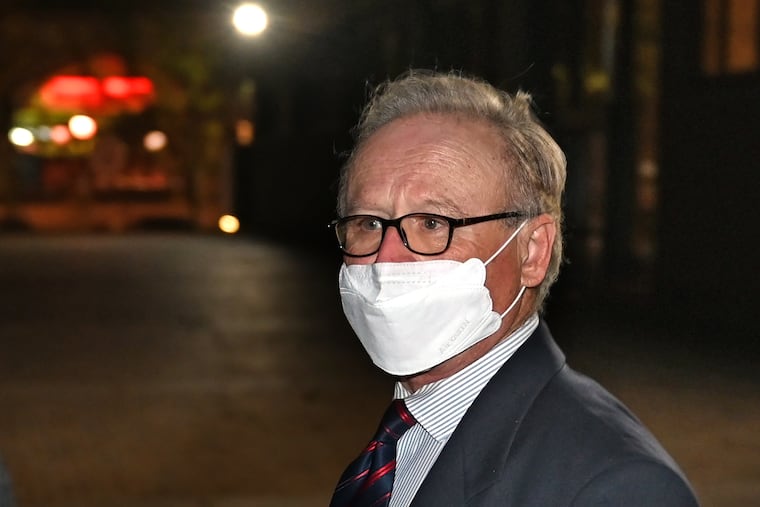Ousted Temple dean continued to tout No. 1 ranking he knew to be based on lies, former administrator testifies
“The staff was extremely upset,” Diana Breslin-Knudsen, a now retired vice dean for Temple University's Fox School of Business, testified. “The dean basically didn’t act like it was a big issue.”

As administrators at Temple University’s Fox School of Business began to suspect in early 2018 that their Online MBA’s No. 1 national ranking had been based on lies, then-dean Moshe Porat appeared strangely unconcerned, a former vice dean at the school testified Thursday.
Porat insisted in meetings that the school would continue to be ranked highly even after it corrected the faulty data. He delivered a champagne toast at a luncheon to celebrate Fox’s spot at the top of the charts for yet another year.
And in the weeks that followed, now-retired vice dean Diana Breslin-Knudsen told a federal jury, Porat insisted on sending out marketing e-mails to donors touting that distinction against the advice of others.
“The staff was extremely upset,” Breslin-Knudsen said. “The dean basically didn’t act like it was a big issue.”
That testimony came on the fifth day of Porat’s trial on federal fraud charges as prosecutors sought to show that the dean not only played a role in falsifying the information the school was sending to publications like U.S. News and World Report, which publish competitive annual rankings on college programs each year, but also that he tried to downplay or cover-up those lies once they were exposed.
Porat — who was fired from his job as dean in 2018 amid the fallout — has denied any involvement in the false submissions and has sought to blame his subordinates, including Marjorie O’Neill, an administrator who oversaw what the school was sending to outlets like U.S. News each year.
“She did something very purposefully with playing with the data,” Porat said of O’Neill in a video deposition played for jurors Thursday. “Not listening to everyone else. Imposing her will on the data.”
O’Neill pleaded guilty to conspiracy charges earlier this year and may testify later in the trial. She’s maintained that she acted under Porat’s orders — a claim Breslin-Knudsen said on Thursday that O’Neill made to her as well.
Breslin-Knudsen, who spent nearly half of her four-decade career at Temple working under Porat was viewed by others at the school as a member of his inner circle and one of Porat’s “yes men,” enabling his obsession with Fox’s rankings and rarely pushing back against behavior others viewed as problematic.
Breslin-Knudsen denied that Thursday, testifying that she never raised questions about Temple’s rankings submissions before 2018 because she hadn’t seen the data O’Neill was submitting on the school’s behalf.
But in a lengthy and at times tense cross-examination, Porat’s attorney, Michael A. Schwartz, noted that not only was Breslin-Knudsen — not Porat — O’Neill’s direct supervisor, she also gave her glowing performance evaluations for “carefully monitoring the data” and “ensuring their accuracy.”
When problems with O’Neill’s work did come to her attention, Breslin-Knudsen acknowledged, she did not tell Porat, but rather delegated it to others to handle.
Testifying Thursday, she said she regretted that.
But, asked Schwartz, “were you committing fraud in your mind?”
Breslin-Knudsen responded: “No.”
Still, the former vice dean insisted that while her name appeared on O’Neill’s performance evaluations, it was Porat who actually supervised her on all matters pertaining to rankings.
She told jurors she often saw Porat hovering over O’Neill’s desk, discussing rankings with her and paging through binders she kept full of data on Fox’s students, including information on the number of students who took graduate school entry exams like the GMAT.
When Poets & Quants, a news outlet focused on the business education market, published an article questioning the authenticity of Fox’s rankings submissions — especially its claim that 100% of Fox online MBA students had taken the GMAT — in January 2018, Breslin-Knudsen said she immediately knew that claim was false. Her first impulse was to blame O’Neill, too.
“I felt sick,” she said. As for whether to own up to the error and report it to U.S. News, Porat, she testified, argued against it.
“Everyone in that meeting, except for the dean, said ’You have to,’ ” report it, Breslin-Knudsen said. “You can’t just sweep this under the carpet. He was protesting, but eventually gave in.”
Later that day, she privately confronted O’Neill, who told her Porat had ordered her four years earlier to fudge the numbers to improve Fox’s rankings results, Breslin-Knudsen recalled.
“She indicated that [Porat] had told her to report the 100% GMATS,” she said.
In the days that followed, Porat — whom other witnesses have described as a volatile and controlling boss — bounced from downplaying the seriousness of the false submissions, to raging against O’Neill, to attempting to stop others at the school from looking too deeply into the data discrepancies, Breslin-Knudsen said.
But despite questions over who was at fault, there was no question the data Fox had submitted to the rankings publications was fraudulent. And Breslin-Knudsen said she was alarmed at how Porat, against the advice of the school’s other deans, continued to push for the school to use its fraudulently obtained No. 1 ranking in marketing pitches.
“I would not have allowed this,” she said.